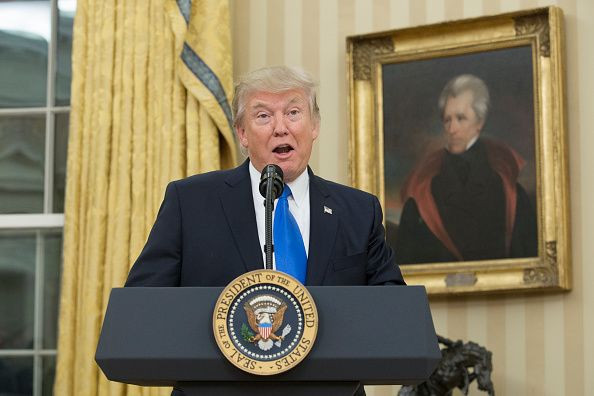How Donald Trump Compares To Past Presidents: POTUS And Andrew Jackson Ran As Fighters, Outsiders [Opinion]

The comparisons between President Andrew Jackson, “Old Hickory,” our seventh president, and President Donald Trump are remarkable. Both started their presidencies as Washington outsiders, men of the people and scrappers who didn't mind a fight. Jackson ended up with a poor record for his methods, but a relatively good one for results. Time will reveal the final report card for the Trump presidency, but Jackson may provide some hints.
The similarities start with the election of 1828. Jackson, a rough-and-tumble individual from the hills of North Carolina — and later Tennessee — ran against the well-bred incumbent, John Quincy Adams, to whom the presidency was almost a birthright. But Jackson portrayed Adams as having been responsible for a high national debt and for the “corrupt bargain” he was alleged to have made with Henry Clay, allowing the latter to become Secretary of State.
It was the battle of the Eastern elite vs. the frontier. As President Adams appealed to the upper class, Jackson's message was for the masses.
To say Jackson was a cantankerous person is an understatement. He waged war against Native Americans and supported slavery. Unable to control his temper, he participated in numerous brawls and killed at least one man in a duel. He was also rumored to have killed someone in cold blood. Though as a general, Jackson was considered a hero of the War of 1812, he is said to have caused the First Seminole War when he invaded Spanish Florida in violation of his orders, leading to an international incident when he executed two British citizens.
Like the current president, Jackson was unpredictable, even considered wild by some. He drank heavily early in life, but later swore off spirits completely; Trump claims he's never touched a drop of liquor. Though Jackson lacked a formal education and Trump possesses an Ivy league degree, neither would be considered among the gentry and both might be labeled anti-intellectual, as when Trump claims he learns most of what he knows from “watching the TV shows.” There is a commonality of reckless youth followed by piousness. Trump was sent to military school as a teenager.
In his personal life, Jackson was accused of condoning bigamy because his wife was married to another man when they began living together. President Trump has been married three times — though at different times. Marital scandals plagued both men for years.
Once in the White House, there are also many striking comparisons, even considering the Trump presidency remains in its nascent stages.
Both men have seen themselves as guardians of the Constitution — according to their own personal interpretations — and as protectors of the people. But they have also shared a craving for power. Jackson was sometimes referred to as King Andrew I, one who, like his 21stcentury counterpart, appeared to think he could do anything he wanted.
As with Trump, Jackson fought with his opponents and with members of his own party. He was unpredictable and quick to anger. He expressed himself publicly, not using Twitter but via open letters to friends that were reprinted in newspapers. The trusted close advisers in both administrations, chosen for their loyalty rather than expertise, have been looked upon unfavorably. Jackson's “kitchen cabinet,” unofficial consultants who paralleled the presidential cabinet, caused a great deal of consternation. His real cabinet was made up of businessmen and politicians whom he thought he could control.
When summed up, Jackson's presidency is considered by today’s historians as a good one. He had a positive impact on economic growth and expansion of the U.S. territory and the advancement of democracy. By the end of his two terms in office, more Americans were participating in the democratic process, hence the term, Jacksonian Democracy. The rise of modern political parties during his time in office engaged more people; the popular vote tripled between Jackson's loss in 1824 and his victory four years later. Jackson helped usher in modern politics.
While it is perceived as a negative today, in the 19th century Jackson was lauded for moving the Native American population westward, allowing Americans — and immigrants from Europe — to claim additional land.
His policies favored efficient government and he oversaw a stable economy, though there are those who blame him for its eventual collapse. The Panic of 1837, may have been caused by his withdrawing funds from the Second Bank of the United States. (He put the money into banks loyal to his administration.)
The next three years will tell the tale of this comparison between two populist, anti-establishment figures, but so far there are striking similarities that warrant further study. The fact that President Trump has Andrew Jackson's portrait hanging inches from the historic Resolute Desk in the Oval Office signifies that maybe even he expects to follow Jackson's model.
Correction: The Corrupt Bargain was between Adams and Henry Clay, not John C. Calhoun as originally published.
Thomas Chambers is a professor of history at Niagara University and the author of Memories of War: Visiting Battlegrounds and Bonefields in the Early American Republic.
© Copyright IBTimes 2024. All rights reserved.





















